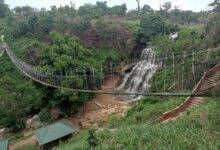Counting on innovation and improvisation in the quest to secure agriculture in Africa
BACKGROUND TO THIS SEGMENT
This segment Ideas First, Africa! is a creation of the Ghana Parliamentary Resource Center, an entity within the information section of the Ghana Parliamentary Service.It has been conceived of as a useful tool for managing the expanded responsibilities of the Resource Center. Ideas First, Africa!keeps an eye on development related initiatives and activities taking place within the West Africa sub-region and beyond. The goal of this exercise is to bring such information to the attention of MPs in the quest to enhance policy deliberation. The raison d’être of this segment is primarily to provide MPs with news on innovative ways of solving problems that confront citizenson a daily basis elsewhere in Africa.
Today’s presentation is inspired by innovation in the field of agricultural technology displayed at a forum recently held in Morocco. The sources of information for this write-up are provided at the tail end.
INTRODUCTION
“Digital innovation as levers of land transformation”. This is what was at stake at the digital forum, “Futur.e.s in Africa,” held in Casablanca, Morocco during which 40 African startups were honoured. On 29th October, 2019 in Casablanca, the startups presented their inventions, notably in agricultural technology i.e. the integration of technology in agriculture to render it more productive, inclusive and sustainable.Participants at the forum included representatives from Cameroun, Benin and Côte d’Ivoire.In the insert reproduced next are the experiences of one of the outstanding participants from Cameroun, Flavien Kouatcha:
Aquaponics,a technique that uses less water and allows land to be cultivated in the heart of towns, is being developed in Cameroun by a young entrepreneur of 28 years in his quest to save agriculture in his country.
Flavien Kouatcha did not name his young enterprise “Save Our Agriculture” by chance. In opting for aquaponics, he has been able to harvest vegetables and fish using only ten percent of water consumed by traditional agriculture in his country and elsewhere in Africa.
Applying a futuristic solution
In order to understand aquaponics well, one must imagine a closed circuit with a big aquarium connected to cultivated lands by means of pipes. The aquarium is filtered by the plants that in turn draw their nutrients from dejectaof the fish.
The idea is to artificially reproduce an eco-system that would allow symbiosis between plants, fish and bacteria in order that the waste of any one of them becomes food for the others.
Faster enrichment of lands under cultivation with no chemical fertilizer.
Thanks to aquaponics, the food grows at a rate of about three times faster without any chemical fertilizer, and consumes one tenth of the water consumed by traditional agriculture. In addition aquaponics allows the cultivation of food in small spaces in towns and in so doing eliminates conventional logistics and associated transportation. For Fabien, that corresponds to a reduction in carbon imprint of about twenty percent.
Production in big quantities directly in towns
Flavien grew up in a rural milieu in a family that managed the rearing of layers. Before getting interested in aquaponics, he worked as a potato grower in the west of Cameroun where he saw that small scale farmers indeed lacked the logistical means of carting their harvests to urban markets. He therefore, after his studies at the university, looked for a system that would allow the production of big volumes directly in towns at reasonable cost. Aquaponics appeared to him to be the best solution to make up for the lack of arable lands and for the introduction of agriculture to towns.
Tens of thousands consume his vegetables and fish.
In the year 2017, “Save our Agriculture” supplied vegetables and fish to nearly one hundred thousand Cameroonians, made up ofusers of kits that he sells and at the same time clients who straight awaybuyvegetables and fresh fish harvested from the farm. “Save our Agriculture” has since 2018 begun its deployment in Senegal and in Rwanda.
Looking into the future
This entrepreneur counts on focusing only on the production and the distribution of agricultural equipment in all of Africa through a network of certified producers. Flavien is convinced that the African agriculture of tomorrow will depend heavily on aquaponics.
“Save our Agriculture” received the Pierre Cartel Prize: “Act with Africa”.The prize was worth ten million francs CFA: equivalent to a little more than fifteen thousand euros.
Figure 1. A water saving urban aquaponics kit system for producing organic food that was presented at the forum by the Cameroonian startup called “Save our Agriculture”. (Credit: RFI)
FOOD FOR THOUGHT
The Comprehensive Africa Agriculture Development Programme (CAADP) policy framework for agricultural transformation aims among others at helping countries critically review their own situations;identify investment opportunities with optimal impact and returns; attain 6% annual growth in agricultural GDP, and allocate at least 10% of public expenditures to the agricultural sector.
Compliance with this international agreement is boosted by the willingness of states to demonstrate leadership in this regard.A case in point has been the stellar efforts of the Kingdom of Morocco.Observers such asTamba François Koundounopoint to Morocco’s desire to “lead the way as African governments push for policies to adapt agriculture on the continent to the challenges of a digitized, globalizing economy.”
On 6th September, Morocco World News announced that Morocco’s Office Cherifien de Phosphates (OCP) and the Ghanaian government had signed an agreement to build a fertilizer plant in Ghana by 2024. The agreement was hailed as an essential component of OCP’s intra-African venture, “to not only be a regional and continental leader in terms of agricultural output, but also as a fulfillment of the urge to be an indispensable party in the pan-African vision to reach food security and stability.”
At the Africa Agri Forum held in Libreville, Gabon, on Thursday, November 21, 2019 participants are reported to have spoken generously of Morocco’s “successful” sustainable agriculture model.
At home here in Ghana, some efforts have made at introducing aquaponics into mainstream agricultural practice albeit at an understandably slow pace. A common reason adduced for the sluggish takeoff has been the touted high financial outlay involved in this undertaking. The good news is that there is evidence of aquaponicsbeing viable in the long run when managedprofessionally. What is more, international forums dedicated to agricultural development issues such as has been reported on in this write-up, offer valuable opportunities for practical learning and improvement.
It goes without saying that a significant aspect of Ghana’s current agricultural policy and programmes, as expressedby the various modules in operation, stands to benefit from participation in such forumspromotingsolutions to practical agricultural challenges in our part of the world.At least, one can imagine the economic and environmental gains to be had from a successful roll out of an aquaponics programme in all (public) educational institutions in the country.
By Pius Acolatse





